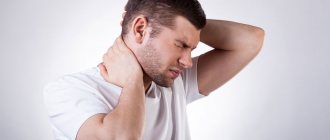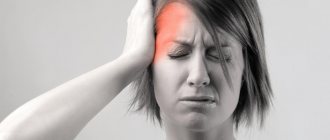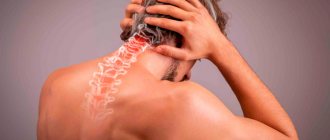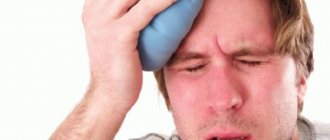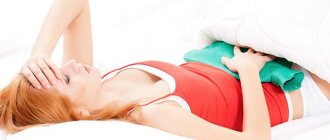Pain in the back of the head is a fairly common problem. And she has many reasons. Therefore, it is important to find their problems in order to feel relief. Let's find out together with a specialist how to do this.
Headaches in the back of the head can have several different causes. For example, it may only be muscle damage due to a minor injury, or it may be a secondary symptom of other pathologies. The type and location of pain can play a critical role in diagnosing the cause. If the pain is severe and repeated, be sure to consult a doctor.
Causes of pain in the back of the head in an adult
“Pain in the back of the head itself does not indicate the cause of this pain,” explains neurologist Elena Gaivoronskaya.
– The doctor assesses the frequency of pain, its intensity, duration, nature (pulsating, pressing, stabbing), associated symptoms. Only on the basis of all this data can a diagnosis be made. There are a number of reasons why headaches may occur predominantly in the back of the head.
headaches .
This is the most common cause of pain in the back of the head. Such pain can last from 30 minutes to 7 days. Such pain can be caused by severe stress, overwork, lack of sleep, malnutrition, poor posture or not drinking enough water.
Patients with this problem usually feel tension in the back or front of the head. The pain can range from dull to severe.
Migraine.
Another common type of headache that often appears in childhood and gets worse with age. Migraines are most common in women. Its symptoms include severe pain on one side of the head with nausea, vomiting and blurred vision. Patients are usually sensitive to light, noise, or smell. Physical activity may increase pain. It can last from several hours to several days.
Causes of migraines include emotional or physical stress, environmental and dietary changes. Sometimes medications (such as birth control pills) can also cause migraines.
Overuse of medications or recurring headaches.
These headaches can develop if a person takes too many painkillers. They are very strong and are often accompanied by nausea, anxiety, irritability, fatigue, difficulty concentrating, memory loss and even depression.
Occipital neuralgia.
A rare but severe headache that usually begins at the base of the neck and spreads to the back of the head and then behind the ears. Often occurs when the occipital nerves, which run up the back of the neck to the base of the skull, are damaged or irritated. The pain is accompanied by a burning or shooting sensation and persists on one side of the head, but often intensifies with movement of the neck. The patient is usually sensitive to light.
Possible causes include spinal injury, tumors, nerve damage caused by diabetes, swollen blood vessels, and rarely infection.
Headaches during physical activity.
They occur as a result of stressful activities and often occur after physical exercise. This pain resembles palpitations and can last from 5 minutes to 2 days.
Often occurs after heavy weight exercise or running. But sometimes they happen after sexual intercourse or pushing in the toilet.
Headache due to arthritis.
It appears in the back of the head and intensifies with movement. May be the result of arthritis of the first, second or third vertebra. Either it is associated with changes in the bone structure of the neck or inflammation of the blood vessels in the head.
In addition, the cause of a headache in the back of the head can be:
- osteochondrosis of the cervical spine;
- high blood pressure;
- increased intracranial pressure;
- stress;
- brain tumors;
- brain aneurysm;
- subarachnoid cerebral hemorrhage;
- cervical spine injuries and traumatic brain injuries;
- meningitis.
Treatment of headaches and ear congestion
Treatment tactics are selected individually, depending on the cause of the headache and ear congestion, as well as the patient’s age, concomitant diseases and other factors. To eliminate both the root cause and symptoms of diseases, the following methods can be proposed:
- antibiotic therapy is the main stage in the treatment of bacterial inflammatory processes, as well as the prevention of purulent complications;
- symptomatic treatment , which includes anti-inflammatory, painkillers, ear drops;
- surgical methods - necessary to remove sulfur plugs, neoplasms, as well as to extract the contents of the paranasal sinuses for sinusitis;
- physiotherapy – prescribed for chronic ENT diseases.
Doctors at the Clinical Institute of the Brain prescribe a minimum of therapeutic techniques that will bring maximum results. Here are specialists of a wide and narrow profile with many years of experience in treating various diseases that manifest themselves as headaches and hearing impairment.
Modern methods of treatment
Treatment methods depend on the diagnosis.
Tension headaches.
They are usually treated with painkillers, massage and sometimes meditation. However, frequent tension headaches require medical supervision.
Migraine.
Treatment for this disease includes painkillers and rest in a darkened room. Doctors often recommend lifestyle changes, hormone therapy, and anti-migraine medications such as triptans to reduce the frequency and intensity of migraines.
Returning pain.
The best treatment for this type of pain is to stop taking painkillers. Yes, at first the headaches get worse, but they go away quickly.
In severe cases, you should consult a doctor - physical or behavioral therapy may be required to break the habit of using analgesics.
Occipital neuralgia.
It can be treated with heat compresses, rest, massage, physical therapy or painkillers. Severe pain may require oral muscle relaxants, nerve blocks, steroid injections, or local anesthesia. In rare cases, surgery is necessary to relieve pressure on the nerves or block pain impulses to that part of the body.
Pain during physical activity.
Taking painkillers before exercise can solve this problem. In addition, it is important to avoid stress, eat right and get enough sleep.
Causes
Pressure in the ears occurs due to a number of factors and ailments. These may include serious illnesses and completely harmless ones, for example, prolonged listening to music at high volumes in headphones. The most common causes of pressure in the ears are:
- otosclerosis (bone growth) and inflammation in the middle ear;
- pathologies of a neurological nature (cervical osteochondrosis, pinched vertebrae)
- atherosclerosis of blood vessels in the brain;
- high/low blood pressure of various etiologies (obesity, alcohol and tobacco abuse, depression, stress, heart problems, physical exercise, vascular disorders, etc.);
- injuries of the skull, head;
- tumor (acoustic neuroma) of the auditory nerve;
- otitis, sinusitis, rhinitis, earwax, aerootitis;
- everyday (natural) reasons - long telephone conversations, sleep disturbances, prolonged listening to music, overwork, sudden changes in atmospheric pressure, water getting into the ears, flying on an airplane, diving, etc.
Popular questions and answers
We asked neurologists to answer questions related to headaches in the back of the head.
When can a headache in the back of your head be dangerous?
“Such symptoms,” says neurologist Olga Zincheva, “can include:
- concomitant increase in body temperature;
- weakness, awkwardness;
- numbness and tingling in the limbs or one limb;
- prolonged increase in pressure, difficult to reduce;
- severe headaches;
- headaches are accompanied by nausea and vomiting;
- double vision, impaired consciousness.
When to see a doctor for a headache in the back of the head?
“There are signs,” explains Olga Zincheva, “that require medical attention:
- you have a headache for the first time for no apparent reason;
- pain lasts several days;
- there are concomitant diseases.
“You need to go to the hospital immediately,” adds colleague Elena Gaivoronskaya, “if the headache occurs suddenly, it is very intense, there was no such pain before, or if the pain is accompanied by weakness in the limbs on one side of the body, a distortion of the face, speech disorder, or lack of coordination. If you have other alarming symptoms, you should consult a doctor as planned. You should also see a neurologist if you are taking too many pain medications or if your headaches are affecting your quality of life.
How to relieve an attack of severe noise in the head and ears
Treatment for severe head noise depends on its cause. If it occurs suddenly, is intense, is accompanied by vomiting, severe pain, heaviness in the head, dizziness, significantly worsens the person’s condition, and it is dangerous to fight it on your own - it is important to call an ambulance as quickly as possible.
Shpidonov Gennady Stanislavovich
Neurologist
Rostov State Medical University (neurology)
10 years of experience
If it is a sign of chronic pathology, is already familiar to you, and is not the first time it has appeared, you can try to cope with the noise using the following self-help methods:
- taking a relaxing bath;
- a full eight-hour sleep (on a comfortable mattress with a comfortable pillow, in a dark room, in silence);
- physical activity (such as yoga or jogging in the park);
- listening to calm music.
Some people are helped to eliminate noise by so-called “masking” - listening to a pleasant, soothing sound (such as the splashing of waves, the murmur of a stream, the chirping of birds) directly in nature, using an audio recording or a special device.
Signs and symptoms of presyncope: dizziness, nausea
Symptoms of presyncope are characterized by sudden development, which is usually provoked by certain factors. A stuffy room, tight clothing, stressful situations, excessive physical activity, eating - all this can contribute to the onset of an attack.
The most characteristic symptom of presyncope is dizziness, which may be accompanied by nausea. This indicates disturbances in the functioning of the human autonomic system.
There is a certain risk group of people for whom the presyncope may be permanent. These are people suffering from hypotension (low blood pressure), chronic anemia (low hemoglobin level in the blood, less than 100 units), bradycardia (low heart rate, less than 40 beats).
Any of the described signs is a serious reason to see a doctor. But, since an attack of pre-fainting can occur at any time and in any place, it is necessary to have at least a general understanding of how to provide first aid to the victim or yourself at home.
Diagnostics
The diagnosis and treatment of pathologies associated with this symptom is carried out by an ENT doctor (otorhinolaryngologist) or an audiologist (a narrower specialty in otorhinolaryngology). During the appointment, the specialist talks with the patient, examines him, conducts the necessary examination, and establishes a diagnosis.
The multidisciplinary CELT clinic employs experienced, highly qualified otolaryngologists. Rich clinical experience helps them make the correct diagnosis in the most difficult cases.
Inflammation of the inner ear (labyrinthitis)
The labyrinth is an organ of hearing and balance, is richly innervated and includes auditory and kinetic receptors, so its inflammation causes:
- severe ear pain and headaches;
- a sharp decrease in hearing, the appearance of noise, crackling, squeaking in the ear;
- dizziness, nausea, loss of orientation in space, horizontal nystagmus.
Labyrinthitis occurs as a result of the penetration of infection in various ways from different parts and cavities of the body:
- from the middle ear with untreated or advanced otitis media;
- with infected meninges during meningitis;
- with blood for diseases such as syphilis, tuberculosis, herpes;
- damage to the temporal region, the organ of hearing with disruption of the integrity of cells and blood vessels.
The disease requires immediate medical attention.
Eustachite
Eustachitis is an inflammation of the canal connecting the middle ear to the nasopharynx. The degree of pain varies. Characteristic features are:
- feeling of stuffiness in the ear;
- noise and crackling in the ear, the patient hears his voice as too loud with a weakened perception of extraneous sounds;
- sensation of water pouring into the ear.
In the absence of timely treatment, eustachitis becomes chronic, causing chronic exudative otitis media.
Otitis externa
Most often, inflammation of the outer ear is bacterial in nature.
The causes of infection may be:
- trauma to the external auditory canal, for example, from a sharp or blunt object, or from a hearing aid;
- skin defects due to eczema, psoriasis, diabetes and other diseases;
- too thorough removal of earwax, which creates an acidic environment that prevents the growth of microbes;
- frequent entry of water into the outer ear (“swimmer’s disease”).
Symptoms of external otitis:
- acute ear pain, aggravated by pressing on the tragus or pulling the earlobe;
- possible itching and a feeling of “stuffiness” in the ear;
- discharge of a purulent or bloody nature, sometimes having an unpleasant odor;
- examination reveals swelling and hyperemia of the external auditory canal;
- possible hearing loss;
- enlargement and tenderness of the lymph nodes in the neck and behind the ear on the affected side.
The course of the disease may be complicated by a perforation of the eardrum, which cannot be determined without a visit to an ENT specialist.
External otitis of fungal origin is a common phenomenon, usually occurring in patients with low immune status or due to long-term use of antibacterial drops. It is characterized by severe itching, the formation of crusts, profuse thick discharge and the absence of a therapeutic effect from the use of antibiotics.
Separately, it is worth noting the localization of a boil on the skin of the external auditory canal or inflammation of the atheroma. The clinical picture is similar to otitis externa, but upon examination there is a more localized focus of inflammation with an opening from which pus and blood can be discharged.
